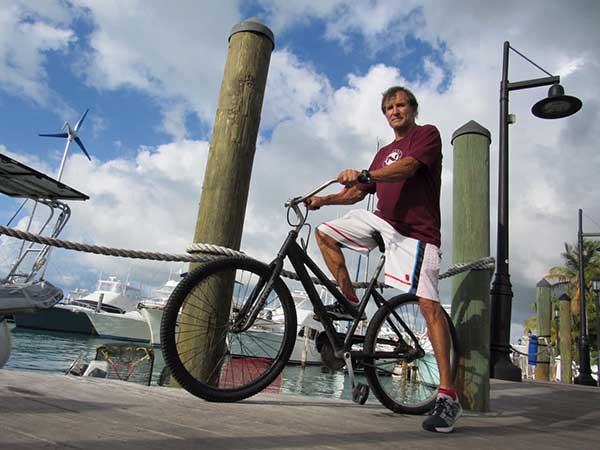Long before they came for him with a black hood and handguns, Dan “Tito” Davis — a lifelong drug dealer by trade — sensed his fate had already been decided.
Davis, now 63, was born in Pierre and grew up in Onida, the son of “Shorty,” a mechanic, and Marcelleen, a homemaker who later spent 20 years toiling as a janitor at the local school. The small town about 25 miles northeast of Pierre was idyllic in the 1960s and early ’70s, when Davis spent his youth riding bicycles and hunting pheasants, geese and deer.
“It was a great place for kids, no drugs, no crime,” Davis recalled in an interview last week. “You’d ride horses around and the worst thing we ever did was stealing apples, you know?”
But everything changed when Davis moved west to attend Black Hills State University in Spearfish. In his 18-month stint at the college, he didn’t pay much attention to his classes, but he did discover that selling white-cross pep pills to classmates paid extremely well.
Over time, living in a remote, sparsely populated area, Davis realized he needed to find a larger market.
“It was kind of boring and I could see I needed to do more in life than hang out in the Black Hills,” he said. “It was so cold. At the time, nobody knew what the University of Nevada-Las Vegas was, so I transferred down there in 1974.”
Las Vegas wasn’t then the gambling mecca and sin city we know today, Davis said. With a population hovering around 200,000, Vegas was safe, he said, the kind of community where you could leave your keys in your car and not worry about a thief driving off with it.
“The mob was running the town,” he said. “It was a small-town environment. Glenn Campbell and Donna Summer would speak at our college classes, then give us tickets to their shows.”
Trading in drugs
But Davis wasn’t interested in late-night dancing to the latest disco hits. He was concentrating on taking his illicit drug dealing to the next level. After unsuccessful experiments with pill presses in his own home, Davis founded Pucci Pet Products, a cover, and soon had pharmaceutical giant Eli Lilly manufacturing millions of then-legal ephedrine pills, which he then distributed nationwide with the help of contacts in the Bandidos motorcycle club.
“When it was really rolling, we were selling more than a million pills a week,” Davis said. “My cut was about $200,000 a week. We had a helluva market because we had the product — no chipped pills — these were professionally made.”
Soon Davis was living the high life, a 24-year-old married to the daughter of a prominent Rapid City family, sporting gold and diamond “bling,” buying luxury homes and classic cars, and investing in apartment complexes and real estate developments. At one point, he owned a flight school and three or four airplanes, making it easier to transport his illegal wares anywhere in the country.
It wasn’t long before Davis moved up to dealing cocaine, which gained popularity in the late ‘70s and early ‘80s. He was soon flying kilos of cocaine, valued in the millions of dollars, between Miami and Denver.
“Cocaine was the drug of choice for rich, cool people,” Davis wrote in his new book, “Gringo: My Life on the Edge as an International Fugitive.”
“For a hundred dollars a gram, you could fantasize that you were partying with Andy Warhol and Bianca Jagger at Studio 54, having a shootout with Sonny and Crocket on the mean streets of Miami, or breaking off a bit from one of Tony Montana’s bricks.”
His first bust
Shortly after the feds uncovered 10 kilos of the illegal powder in an associate’s storage bin, Davis was indicted on a slew of charges. Eventually, he pleaded guilty to tax evasion and illegal use of a telephone, was sentenced to 102 months in a federal prison, and had virtually everything he had accumulated seized as gains from illicit drug transactions. Six days after his first child was born, Davis was sent to prison, where he would spend “a nickel,” or a five-year stint.
Divorced by his first wife just weeks before being released from prison, Davis returned to South Dakota and worked 7 a.m. to midnight seven days a week with his mother at a small ice cream parlor in Keystone. When winter came and the shops closed, he returned to Las Vegas, fell in love, married the daughter of a wealthy family and returned to his former habits.
After reconnecting with his Mexican marijuana suppliers, within 18 months he was clearing $50,000 a week. Learning from his earlier experience with the feds, Davis began stashing cash in a Mexico City bank, later saying “it was the wisest move that I ever made.”
Reluctantly, Davis said he began fronting his product to an old grade-school chum. When the feds arrested that childhood friend with $28,000 in cash and 2 ounces of meth, Davis said the guy “folded like a Texas Hold ‘Em player with an off-suit deuce-seven” and gave Davis up to authorities, claiming he had supplied the meth.
Soon arrested again on felony drug charges tied to his friend’s erroneous testimony, Davis spent 63 days in a Deadwood jail before being released on bond shortly before his scheduled trial.
“My attorney said it wasn’t looking good and commented that he couldn’t believe I was still here,” Davis said last week. “I was looking at 30 years in a federal facility, which would have basically meant life in prison.”
So he fled.
Life on the lam
Taking a flight from Denver to the Mexican border, Davis jumped on a train and spent months in small towns in Mexico’s interior, avoiding coastal resorts populated by sun-seeking Americans, and hiring private tutors to teach him Spanish. At 40 years old, Davis said his knowledge of the native language didn’t initially extend beyond the cursory greeting of “hola.”
He was ever watchful, abandoning a town if he spotted someone too well-dressed for their surroundings, or after encountering anyone who asked him one too many questions. Fortunately, he said his stashed cash generated friendships and helped him avoid Mexican federales.
“You’re not going to make much of an impression coming into Mexico City with a backpack,” he said. “I had stashed money out of country because if something went wrong, at least I might have a chance. I was the gringo picking up the tab, not a parasite running around.”
Assumed identities
For the next 13 years, Davis explored the world using various forged or stolen passports, visiting 54 countries on five continents, always looking over his shoulder and always avoiding Americans. He watched camel races in India, visited base camps at the foot of Mount Everest, toured Cuba, Germany, Vietnam and the Philippines and spent a year on the Amazon River in Brazil.
Asked how much cash he had funneled into banks out of the country, Davis said matter-of-factly, “I could have gone through $100,000 a year for many years and never run out. I learned the first time — putting stuff in my own name, planes, houses, cars, and the IRS grabbed all of it.”
Along his unplanned path, Davis became an “American brother” to a kingpin in Columbia’s Cali Cartel, successor to Pablo Escobar’s Medellin Cartel, living in violent barrios under protection and even spending several nights sweating out his situation in one drug lord’s underground bunker.
With no permanent residence, no real love in his life, infrequent contacts with friends of the past, and living under numerous assumed identities, Davis said at times he felt lost.
“I walked into a bank one time with three stolen IDs,” he recalled. “I was afraid the bank would run the numbers on my passport and find it was reported stolen. I went to sign for a safety deposit box and I signed the wrong name because I forgot who I was. I was lucky so many times.”
One last love
Eventually, Davis found a new home and a new love in Venezuela, in the form of a 5-foot-11 beauty queen and world-class volleyball player named Mary Luz. After an uneven courtship and worldwide travel, the two married and settled in a small seaside town called El Yaque, popular for its kite-surfing. There, Davis bought land and began constructing a resort catering to rich Europeans. He poured years into the project and was nearly done when the day he knew would come finally came.
As he strode through his resort near his Wind Guru Café in the spring of 2007, Davis noticed several large men in slacks and dress shirts, decidedly out of place on a beach where everyone wore shorts and T-shirts. Moments later, he spotted several black Suburbans with blacked-out windows parked nearby.
“At that moment I knew it was over,” he said. “I couldn’t tell if they were working for a drug cartel, a government or somebody else. At that moment it really didn’t matter.”
Tackled and tied, pistols pointed at his head, which was soon covered with a black nylon bag, Davis was thrown into a vehicle and whisked away. He would spend a week in jail cells at military installations, being repeatedly interrogated and photographed. And he would never see Mary Luz again.
“I didn’t listen to my stomach,” he said last week in a moment of introspection. “I was living in Venezuela with the love of my life, a wonderful wife, and feeling like the mayor of the town. It was too good to be true. I thought, `They’re not going to be looking for me.’ But I was wrong.”
Homeward bound
After five days in a mountaintop cell, Davis was unceremoniously told, “You’re going to the United States.” Even though Venezuela had no extradition treaty with the U.S., and its president, Hugo Chavez, had a contentious relationship with then-President George W. Bush, Davis said his mercenary captors had made a deal and he was quickly flown to Miami and handed off to the U.S. Department of Homeland Security.
Meanwhile, under what he calls a “bogus” money-laundering charge, Venezuelan authorities seized Davis’ entire resort, put Mary Luz and her 94-year-old mother on the street, confiscated her wedding ring and took away everything that would move, all the way down to the light bulbs.
Looking back on his life on the lam and three marriages interrupted by the law, Davis said his greatest regret remained leaving those loves behind.
“I lost three perfectly good wives, that’s the truth,” he said. “I loved every one of them, but I lost them because of the wrong decisions. I struck out — three up and three down.”
After being sent to a federal prison that he described as “the Harvard of crime,” Davis spent months pounding a beat-up typewriter in its law library trying to recount his exploits.
“I was afraid I’d forget it, and I was in a cell and I had time,” he said. “I met so many notorious people in federal prison, but none of them did the stuff I did.”
When he was done, Davis had an 800-page manuscript, which his co-writer, Peter Conti, pared down to 500 pages. His publisher then weaned it to 300 pages.
Reliving life
Released from prison in October 2015, Davis will remain on probation through 2018 and laments that even after serving his time, he still needs to get a pass to travel to WalMart. Living in a one-bedroom apartment in Key West, where nearby bungalows start at $1 million, he says he’s adopted a simple lifestyle and continues to be grateful to friends and family who have stood by him.
“I’m playing some pickle ball, riding my bike, working out, trying to stay healthy and make up for all the years of things I missed,” he said. “It’s wonderful being a normal citizen. My past is fun talking about now, but when you spent so much time as an international fugitive from justice and looking over your shoulder, it’s not good.”






Leave A Comment